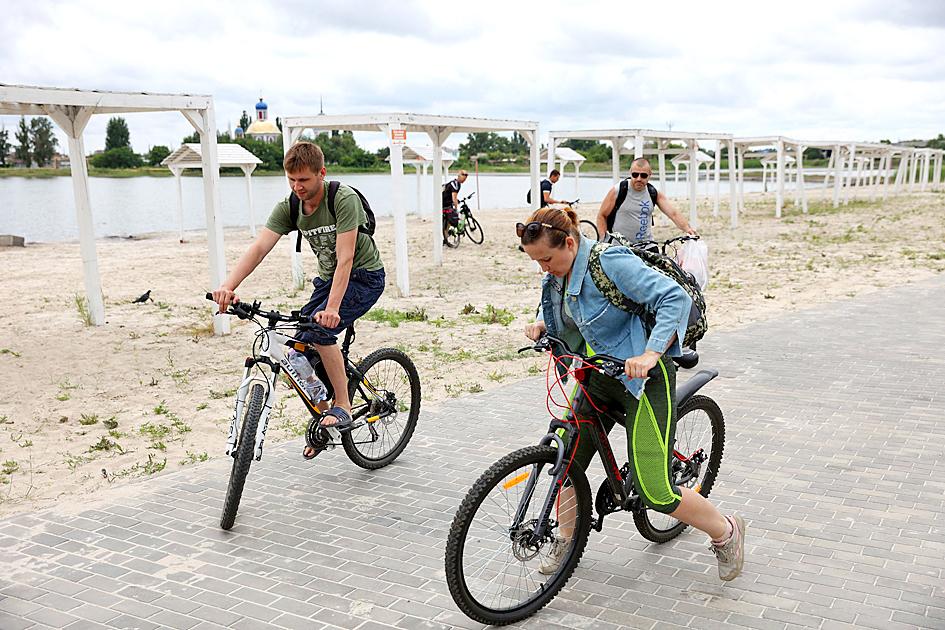With its white sand, changing cubicles and clear water, the beach at Sloviansk in eastern Ukraine looks tempting. There is just one problem: the nearby bangs of rockets and missiles.
The lakeside resort is close to one of the most active fronts in the war with Russia, to the north of Sloviansk, where Ukrainian troops firing from woods and villages are seeking to halt Moscow’s advance.
That does not dissuade some beachgoers.

Photo: AFP
“We just came here to walk around and take some snaps,” Kostyantyn, 40, said, while strolling around wearing wraparound sunglasses and shorts.
“We wanted [to swim], but it’s too cold,” he added, as the sunbaked region had a rare cloudy day.
“A beach is a beach,” he said, taking pictures of his friend Denys at an outdoor gym.
The nearby arms fire sounds like US howitzers, supplied to Ukrainian troops.
The Russian front line is only about 10km away, and the Ukrainian armed forces on Wednesday said that Moscow’s troops were carrying out systematic firing in order to resume an offensive on Sloviansk.
The lake resort was once famous for its salty waters, believed to help relieve joint problems.
A sanatorium built on the spot is no longer open.
“It’s pretty. People come to swim. We also come to see the swans,” said Daniil, 39, who cycled along the beach with a group of friends on the way to buy food in Sloviansk.
Daniil said he is a metal worker at the Sloviansk power station in the nearby town of Mykolaivka, which has halted work due to the war.
Orange plastic letters on a beach hut read: “Be happy this summer,” but the beach loungers have been locked inside.
Ice cream stalls and a massage cabin are also closed.
“We used to come a lot before the war”, Kostyantyn said. “This is just the second time this year.”
He said he has been helping out locally by feeding dogs abandoned by their owners, who have left for safer western Ukraine.
“I’m not scared because I’m a volunteer and have been under shelling,” he said, as loud booms can be heard in the background.
Kostyantyn said that he was caught up in a Russian shelling attack on an evacuation bus in the Kharkiv region in February.
“With what’s happening now, you realize that life is not so threatening. People’s fear is more of a threat, since what they fear comes true,” he said.
As the war draws on, those who opted not to evacuate from the area have become “very pushy and hardened,” he said. “I think it’s more like a form of nerve stress.”
“There are those who are waiting for Russians to come,” his friend Denys said.
“People think it will be better, that they’ll get a Russian pension,” he added.
There are also some who already receive benefits from the Moscow-backed separatist regions, Kostyantyn said.
In 2014, Sloviansk was taken over by Russia-backed separatists, but Ukraine won it back after a lengthy siege.
Now the sleepy green town has no water or gas, and an unstable electricity supply due to war damage and difficulties of repairs, its mayor said this week.
Stacks of concrete beams on the road from the beach resort into the city creates a lengthy obstacle course for vehicles and trenches have been built along it.

STEPPING UP: Diminished US polar science presence mean opportunities for the UK and other countries, although China or Russia might also fill that gap, a researcher said The UK’s flagship polar research vessel is to head to Antarctica next week to help advance dozens of climate change-linked science projects, as Western nations spearhead studies there while the US withdraws. The RRS Sir David Attenborough, a state-of-the-art ship named after the renowned British naturalist, would aid research on everything from “hunting underwater tsunamis” to tracking glacier melt and whale populations. Operated by the British Antarctic Survey (BAS), the country’s polar research institute, the 15,000-tonne icebreaker — boasting a helipad, and various laboratories and gadgetry — is pivotal to the UK’s efforts to assess climate change’s impact there. “The saying goes

Floods on Sunday trapped people in vehicles and homes in Spain as torrential rain drenched the northeastern Catalonia region, a day after downpours unleashed travel chaos on the Mediterranean island of Ibiza. Local media shared videos of roaring torrents of brown water tearing through streets and submerging vehicles. National weather agency AEMET decreed the highest red alert in the province of Tarragona, warning of 180mm of rain in 12 hours in the Ebro River delta. Catalan fire service spokesman Oriol Corbella told reporters people had been caught by surprise, with people trapped “inside vehicles, in buildings, on ground floors.” Santa Barbara Mayor Josep Lluis

Police in China detained dozens of pastors of one of its largest underground churches over the weekend, a church spokesperson and relatives said, in the biggest crackdown on Christians since 2018. The detentions, which come amid renewed China-US tensions after Beijing dramatically expanded rare earth export controls last week, drew condemnation from US Secretary of State Marco Rubio, who on Sunday called for the immediate release of the pastors. Pastor Jin Mingri (金明日), founder of Zion Church, an unofficial “house church” not sanctioned by the Chinese government, was detained at his home in the southern city of Beihai on Friday evening, said

SANCTIONS: Congolese Minister of Foreign Affairs Therese Kayikwamba Wagner called on the EU to tighten sanctions against Rwanda during an event in Brussels The Democratic Republic of the Congo (DR Congo) has accused the EU of “an obvious double standard” for maintaining a minerals deal with Rwanda to supply Europe’s high-tech industries when it deployed a far-wider sanctions regime in response to the war in Ukraine. Congolese Minister of Foreign Affairs Therese Kayikwamba Wagner urged the EU to levy much stronger sanctions against Rwanda, which has fueled the conflict in the eastern DR Congo, describing the bloc’s response to breaches of the DR Congo’s territory as “very timid.” Referencing the EU’s response to Russia’s invasion of Ukraine, she said: “It is an obvious double standard